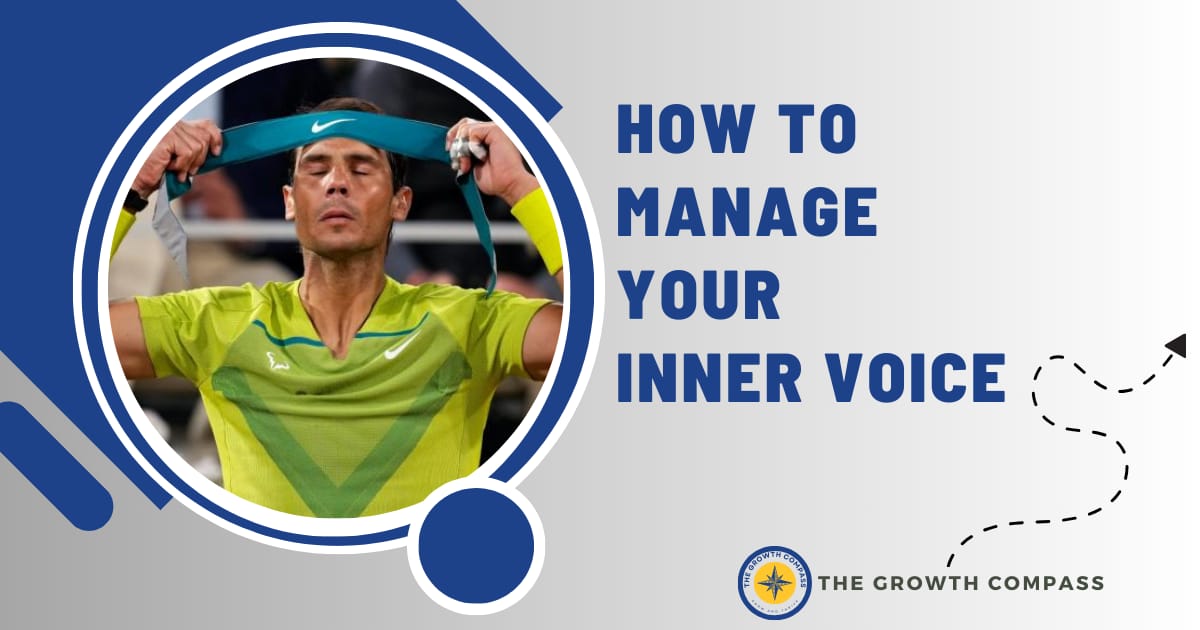
Good Day, and welcome to The Growth Compass!
GREAT NEWS 🚨 We have given all subscribers access to our FREE Growth Compass Library that you can access HERE.

Here’s Where We Are Headed Today:
Ethan Kross on Self-Talk
How to Manage Your Inner Voice
Great Posts of the Week
Free Mental Fitness Links 👇
Ethan Kross on Self-Talk
"When our chatter is buzzing, it drains us of the neural resources we need to focus, get distance, and regain control of our inner voice. Yet distanced self-talk sidesteps this conundrum. It is high on results and low on effort.” - Ethan Kross

How to Manage Your Inner Voice
Today’s newsletter was inspired by the video below titled What to do if your inner voice is cruel with Ethan Kross, author of the book, Chatter: The Voice in Our Head, Why It Matters, and How to Harness It.
What is your inner voice? Ethan defines the inner voice as “your ability to silently use language to reflect on your life.”
How does chatter differ from your inner voice? “Chatter refers to the dark side of the inner voice.”
When we turn our attention inward to make sense of our problems, we don't end up finding solutions. We end up ruminating, worrying, catastrophizing.
We get stuck in a negative cycle that takes this remarkable tool that we possess, this inner voice, and turns it into a curse rather than a blessing.”
Why does matter? Your inner voice matters because it serves as a tool for reflection. It can be used to help with self-understanding and resilience, allowing you to navigate complex emotions and experiences.
Your inner voice also lets you simulate, plan, and strategize.
Your inner voice helps you control the language you use in your mind.
Your inner voice helps you build a story around what is going on in your life.
Your inner voice helps you make sense of what is going around you.
Where does chatter come from? It’s unknown how your thoughts appear and why they appear. The goal isn’t to control every thought that comes into your mind, but to look at the thought, question it, accept it, and manage how you think about it. That is where your inner voice comes in.
So how can you stop the chatter? Awareness is key. If you can’t stop the chatter, the goal is to be aware of the chatter. You have to be able to zoom out on the language and self-talk that’s going on to take a logical view of what you are telling yourself.
So what are some techniques to improve your chatter or inner voice?
Distance Self-Talking - Talking to yourself in the third person, like King Solomon did in his wise judgments, allows for a shift in perspective that aids in emotional regulation and problem-solving. By using your own name or third-person pronouns, you create psychological distance that helps you navigate intense emotions with clarity and objectivity, akin to advising a friend in need.
Mental Time Travel - Mental time travel involves projecting yourself forward or backward in time, similar to how historical figures like Julius Caesar reflected on their actions. This technique helps you gain a broader perspective on current challenges, reducing the emotional intensity of present experiences by contextualizing them within past successes or future outcomes.
Give Yourself a Sense of Control - Engaging in rituals. Athletes like Rafael Nadal use it in the middle of matches to provide a sense of predictability and control over stressful situations. He will pull on his shorts in the same way before every serve. These rituals create a psychological buffer against anxiety by establishing routines that signal readiness and focus, similar to how rituals instill confidence and preparation in competitive contexts.
Journaling - Journaling, a practice embraced by writers and thinkers throughout history like Marcus Aurelius, serves as a therapeutic tool for organizing thoughts and processing emotions. By externalizing inner dialogue onto paper, you gain clarity and insight into personal experiences, fostering self-awareness and resilience in facing life’s challenges.
Your inner voice is crucial for self-reflection and emotional control. However, unchecked, it can turn into unproductive chatter, leading to rumination and negativity. Techniques like talking to yourself in the third person, mental time travel, rituals for control, and journaling help you manage your inner dialogue effectively, enabling clearer thinking and resilience in facing life's challenges.
Great Posts from the Week
Free Mental Fitness Links 👇
That's a wrap for today. If you want to spread the joy, make sure to refer the newsletter to someone you think would benefit!
Want More?
Feel free to view all of our FREE resources online here and our growing content library!
Interesting in advertising? Fill out this survey and we’ll get back to you soon!
What I am reading and listening to

